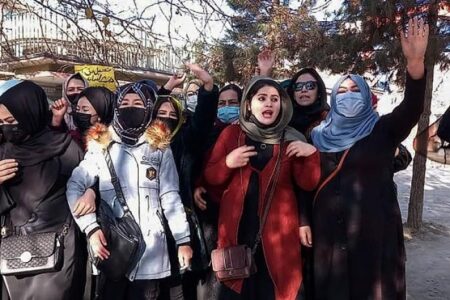
Taliban: ‘A Woman Is a Man’s Property and Must Serve Him, Not Get Educated’
“A woman is a man’s property and must serve him, not get educated,” the Taliban’s higher education minister has said, as the fundamentalist group’s decision to suspend university education for Afghan women continues to draw international condemnation, including from some Islamic governments.
“Islam does not allow women to commit prostitution under the pretext of education,” tweeted Nida Mohammad Nadeem. “A woman is a man’s property and must serve him, not get educated.”
As small groups of Afghan women took to the streets to protest the controversial move, Nadeem went on national television on Thursday to defend it, saying that “prostitution” was occurring as a result of gender mixing in some universities, despite a ban on co-ed learning.
Moreover, he said, some of the fields of study being pursued by women were not in line with “Islamic law and Afghan pride.”
Nadeem said the decision to “stop the education of women” came from the “Amirul Momineen” – a term meaning “commander of the faithful” and ascribed to Taliban leader Hibatullah Akhundzada.
“I presented all the reasons to the nation regarding the decision of Amirul Momineen, may Allah bless him and grant him peace, regarding the prohibition of girls’ education,” Nadeem tweeted after the television appearance.
“Not observing the hijab, traveling from one province to another province to study in dormitories, non-shari’a curriculum, and the existence of faculties that women do not need to study.”
“In addition, in many universities there was still mixing, which opened the way to prostitution.”
Nadeem said women had been studying fields “that were in contrast with the dignity and pride of women and Afghan culture,” singling out engineering, agriculture, and science.
“No one can prove the necessity of studying ‘modern science’ for women even in the Qur’an and Hadiths,” he said, referring to Islam’s sacred text and the written traditions of Mohammed, the religion’s seventh century founder.
Nadeem also warned that any Muslim opposing the Taliban’s ruling on the matter would be viewed as a rebel, “and the punishment for rebellion is clear in Islam.”
(Islamic scholars differ over whether rebellion against a Muslim ruler is subject to hudud punishments – literally “limitations imposed by Allah” – which depending on the offense and interpretation include stoning, limb amputation, flogging, and the death penalty.)
Alongside critical reaction to the Taliban decision from Western countries, some leading Islamic governments also weighed in, joining calls for it to be reversed.
The Saudi foreign ministry Turkey and Qatar also called on the Taliban to reconsider.
Even the Iranian regime, whose treatment of women has triggered months-long protests and saw it ejected from a top U.N. women’s rights agency, expressed regret over the decision.
The Organization of Islamic Cooperation’s women’s division called on the authorities in Kabul “to reverse this hasty decision, which is against Islamic law and Afghan women’s basic rights.”
Nadeem appeared to shrug off the criticism from Islamic governments, tweeting, “We want pure Islam, not like Turkey and Saudi Arabia.”
Secretary of State Antony Blinken said on Thursday it was “important and powerful” that criticism was also coming from Islamic countries.
“There are going to be costs if this is not reversed, if this is not changed,” he told reporters at the State Department. “I’m not going to detail them today, but we will pursue them in coordination with allies and partners.”
‘Within the limits of Islam’
The Taliban seized power in August 2021, two decades after being toppled by U.S.-led forces after the 9/11 terror attacks carried out by its al-Qaeda ally.
Just weeks before Kabul fell, the organization in a statement clearly rejected what it called “non-Islamic forms of governance.”
“Everything from politics, economics, culture and education to social life must be follow our religious values,” it said then. “This is because Afghans do not desire the elimination of military aggression alone, but also the termination of western political, cultural and ideological invasion.”
When the Taliban held its first press conference after seizing power, on August 17, 2021, spokesman Zabihullah Mujahid said the group would respect women’s rights “within the limits of Islam.”
“Our women are Muslims, they accept Islamic rules,” he said. “If they continue to live according to shari’a, we will be happy, they will be happy.”
After setting up an “interim” government comprising in large part U.N. Security Council-sanctioned terrorists, the Taliban banned girls from attending school beyond grade six, and tightened restriction of the movement of women and girls, prohibiting them from flying unless accompanied by a male “guardian,” and recently prohibiting them from visiting parks or gyms.
Last June, the U.N. Security Council in response to the girls’ schooling decision restored a U.N. travel ban for two Taliban education heads, one of whom was the then higher education minister, Abdul Baqi Haqqani.
Haqqani was succeeded in October by Nadeem.
Source: cns news





